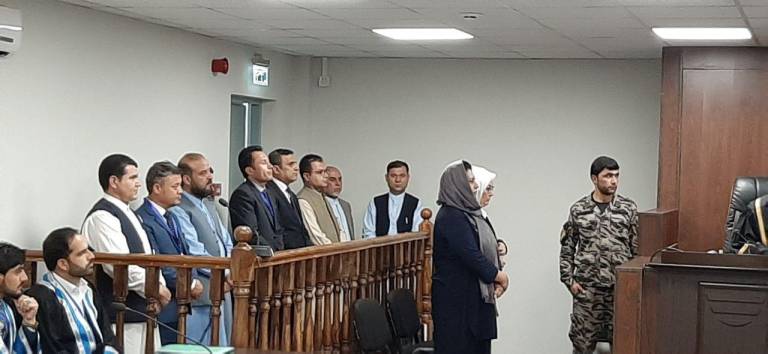A primary court of Afghanistan’s Anti-Corruption Justice Center (ACJC) has sentenced seven commissioners of the Independent Election Commission (IEC) and three commissioners of the Independent Electoral Complaint Commission (IECC) to five years in prison on Tuesday, September 03, on allegations of manipulating parliamentary elections’ result in the eastern Kunar province.
Gula Jan Abdulbadi Sayyad, Wasima Badghisi, Maazullah Dawlati, Rafiullah Bedar, Abdul Qader Quraishi, Hafizullah Hashimi, and Maliha Hassan are seven IEC commissioners who have been sentenced to five years in prison. In addition, Abdul Aziz Ariayee, Humaira Haqmal, and Abdul Baseer Fayeez are the three IECC commissioners who have been sentenced to five years of imprisonment.
Ahmad Shah Zamanzai, former chief of IEC secretariat, and the commission’s ICT director, Sayed Ibrahim Sadat, who were accused of being involved in vote rigging, were acquitted by the court.
The ACJC’s prosecutor claims that the commissioners have canceled 248 votes casted for Saleh Mohammad Saleh, a parliamentary candidate who was running for 2018 parliamentary election from Kunar province.
Upon an official order by the Chief Executive Abdullah Abdullah, the ACJC launched a probe on the case albeit Mr. Saleh had also filed separate lawsuit in the Attorney General’s Office.
Saleh claims that the three IECC commissioners—in line with seven IEC commissioners—have cancelled 248 votes casted for him. He claims that they have deliberately dropped him out the winning list in the final result sheet, and instead, they have declared Ziaul Rahman, another parliamentary candidate, a winner.
The primary court of ACJC has sentenced each of the 10 commissioner to five years imprisonment just for invalidating 248 casted for Saleh in four poll stations in Kunar province.
The commissioners, however, denied the accusation, calling it baseless. They claim that as per confidential letters by the NDS, Mr. Saleh has bought votes in 2018 parliamentary election. The commissioners refused claims made by the Attorney General Office, and described its decision as a politically motivated move encouraged by the leadership of the government.
The three IECC commissioners say that they—in agreement with other commissioners from IEC—have cancelled as many as 248 votes on the basis of evidences of fraud.
The commissioners claim that AGO has made a biased and unjust decision in regard to cancellation of votes in Kunar by the IEC.
According to the law, at the first stage electoral crimes must be investigated by the IECC and then the crimes shall be referred to judicial institutions for further investigation. In Kunar case, however, the AGO has directly launched probe on the case.
Maazullah Dawlati, an IEC commissioner, laughed at prosecutor, during the trial when he introduced the commissioners as offenders by referring to the article 92 of the election law. Dawalati argued that the article was not even about the election result as it was about the list of election nominees.
Maliha Hassan, another IEC commissioner, noted that the judicial institutions cannot even open probe on the case as no crime was committed.
The IECC commissioner, Humaira Haqmal, noted that 90 percent vote share of Saleh should have been cancelled as he had purchased votes.
The electoral commissioners further said that Mr. Saleh must be prosecuted as he had committed electoral crimes.
A case review, previously conducted by senior reporters of Etilaat-e-Roz, shows that Afghanistan’s Attorney General’s Office has passed a partial and biased judgment on cases of vote rigging in 2018 parliamentary election in Badakhshan and Kunar provinces.




